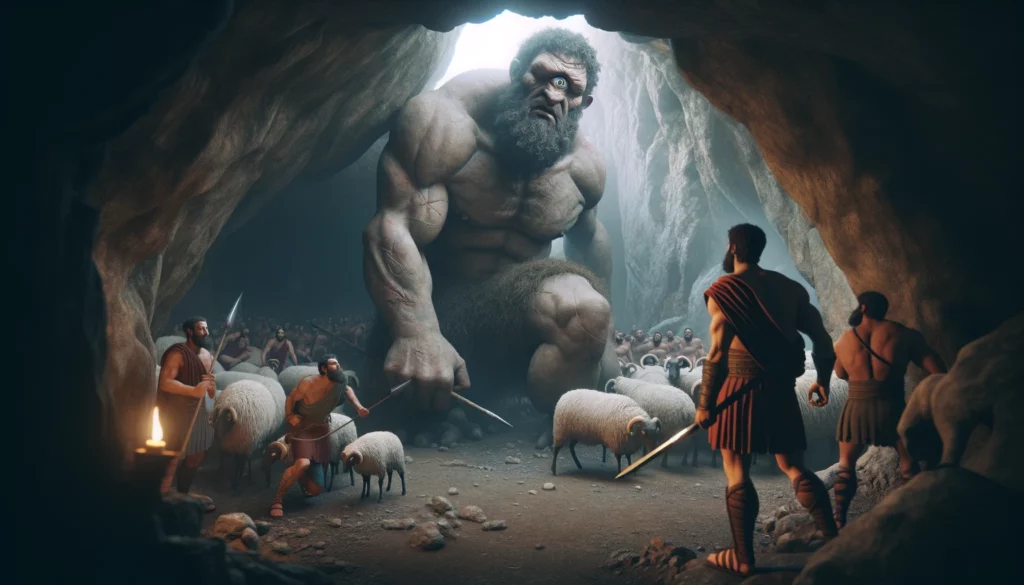
One of the most famous tales from Greek mythology is the story of how Odysseus, the cunning king of Ithaca, outwitted a fearsome Cyclops, a one-eyed giant named Polyphemus. This episode is part of Odysseus’s long and perilous journey home after the Trojan War, as told in Homer’s epic, The Odyssey. Known for his intelligence and craftiness, Odysseus faced numerous challenges on his voyage, but few were as dangerous as his encounter with Polyphemus.
The story of Odysseus and the Cyclops is a classic example of how cleverness and quick thinking can overcome even the most terrifying foes, highlighting the importance of wit and strategy in Greek heroic myths.
Stranded on the Island of the Cyclopes
After the fall of Troy, Odysseus and his men sailed the seas, trying to find their way home to Ithaca. During their journey, they landed on an island inhabited by the Cyclopes, a race of giant, one-eyed creatures who lived in caves and kept herds of sheep. These Cyclopes were known for their brutish nature, and unlike the Greeks, they did not farm, build cities, or follow the rules of civilized society.
Odysseus and his men were curious about the island and decided to explore, hoping to find food and supplies. They came across a large cave filled with cheeses, milk, and sheep. The cave belonged to Polyphemus, one of the strongest and most fearsome of the Cyclopes. Odysseus and his men made themselves comfortable in the cave, eating some of the cheese, thinking they would greet the owner when he returned.
Polyphemus the Cyclops
When Polyphemus returned to his cave with his flock of sheep, he was furious to find Odysseus and his men there. Trapping them inside by rolling a massive boulder over the entrance, Polyphemus demanded to know who they were. Odysseus, sensing danger, introduced himself and his crew as travelers seeking hospitality, but the giant had no intention of treating them kindly. Cyclopes did not honor the Greek custom of hospitality, known as xenia.
In a horrifying display of brutality, Polyphemus grabbed two of Odysseus’s men, smashed them against the cave walls, and devoured them. Realizing they were trapped in the cave with a dangerous and man-eating giant, Odysseus knew they needed a clever plan to escape.
The Cunning Plan: “Nobody”
Odysseus, always known for his wit, came up with a clever strategy to outsmart the Cyclops. He knew that brute strength would not be enough to defeat Polyphemus, so he began by speaking to the giant in a friendly manner, offering him wine that his crew had brought with them. Polyphemus, who had never tasted wine before, was pleased with the gift and drank it eagerly.
As the Cyclops grew drunk, he asked Odysseus for his name. Seizing the opportunity, Odysseus lied, telling Polyphemus that his name was “Nobody”. Amused and drunk, Polyphemus promised that he would eat “Nobody” last, as a strange kind of favor. The giant soon fell into a deep, drunken sleep, giving Odysseus and his men the chance to put their plan into action.
Blinding the Cyclops
While Polyphemus slept, Odysseus instructed his men to take a large wooden stake they found in the cave and sharpen it into a deadly point. Heating the stake in the fire, they waited until it was glowing hot. Then, with all their strength, they drove the burning stake into Polyphemus’s single eye, blinding the giant.
Polyphemus awoke with a terrifying scream, thrashing around in agony as he tried to find the men who had blinded him. But because of Odysseus’s clever trick with his name, Polyphemus called out to the other Cyclopes on the island for help, shouting, “Nobody is hurting me! Nobody is trying to kill me!” Confused by his cries, the other Cyclopes assumed that Polyphemus was fine and did not come to his aid.
Escaping the Cave
Though blinded, Polyphemus still blocked the entrance of the cave with the massive boulder. Knowing that the Cyclops would feel around for them if they tried to leave, Odysseus devised yet another clever plan. He and his men tied themselves underneath the sheep in Polyphemus’s flock. When the giant let the sheep out of the cave the next morning, he felt the tops of their woolly backs but did not notice the men hidden beneath them.
In this way, Odysseus and his surviving crew managed to escape the cave without being caught. Once they were safely away, they untied themselves from the sheep and made their way back to their ship.
The Pride of Odysseus
As they sailed away from the island, Odysseus could not resist taunting Polyphemus, whose roars of frustration echoed from the shore. Revealing his true identity, Odysseus shouted back at the Cyclops, telling him that it was Odysseus, the king of Ithaca, who had blinded him. This act of pride would have dire consequences.
Enraged by this revelation, Polyphemus called upon his father, Poseidon, the god of the sea, to curse Odysseus. He prayed that Odysseus would never return home or, if he did, that his journey would be long and filled with hardship. Poseidon, furious that his son had been blinded, heard Polyphemus’s prayer and became Odysseus’s relentless enemy, causing many of the trials and delays that Odysseus would face in the years to come.
The Legacy of Odysseus and the Cyclops
The story of how Odysseus outwitted the Cyclops is one of the most famous episodes in The Odyssey and illustrates the cleverness and resourcefulness that define Odysseus as a hero. His ability to think on his feet, deceive his enemies, and adapt to challenging situations made him one of the greatest heroes in Greek mythology.
However, the episode also highlights the theme of hubris—excessive pride or arrogance—that often accompanies Greek heroes. While Odysseus’s cunning saved his men from the Cyclops, his prideful taunt to Polyphemus ultimately brought Poseidon’s wrath upon him, extending his journey and increasing his suffering.
The myth of Odysseus and the Cyclops serves as a reminder of the power of intelligence over brute force and the importance of humility in the face of victory.




